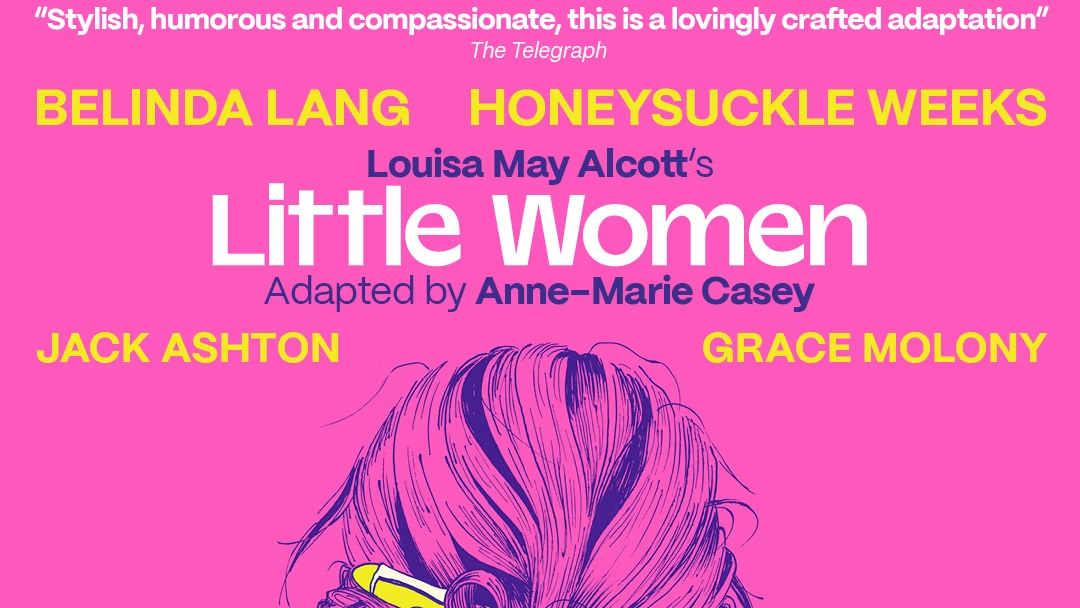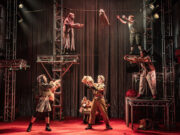The Ministry of Biscuits is a unique collaborative musical comedy by the playwright and composer Brian Mitchell and the author and illustrator Philip Reeve. Following a sell-out 35-date national tour, it comes to the Barons Court Theatre London from Tuesday, 29th January to Sunday, 10th February 2019.
Described by Edinburgh Evening News as, “the freshest comedy in years… absolutely hilarious” and “satire at its best”, the musical was actually written in 1997-8.
Set in a parallel grim post-war Britain of the late 1940s, The Ministry of Biscuits is established to “control biscuits, and to control the idea of biscuits”. Gypsy Cream and the Jaffa Cake are strictly prohibited.
Cedric Hobson, a junior designer, falls in love with Françoise Celestine Courvoisier, his new French secretary. He resolves ‘to shake confectionary to its very foundations’ and in doing so win her heart. This results in his world – and the ministry – being turned upside down. Who knew that eating a fancy biscuit could make you a criminal!
The
Philip Reeve is a winner of The Carnegie Medal, the Guardian Children’s Fiction Prize and the Los Angeles Times Book Award, whose best-selling novel Mortal Engines is now a major motion picture. Multi-award-winning playwright and composer Brian Mitchell is known for Those Magnificent Men and Big Daddy Vs. Giant Haystacks.

40′s British Light Music, Orwell’s 1984 and The Ealing Comedies inspired this play. Some people feel we are living in an Orwellian time at the moment. You wrote the play first in 1997-8. What if anything, that is happening now around the world, informed the themes in this iteration of the play?
Philip Reeve: This production uses the original script, so we haven’t altered anything to make it more relevant – it’s more
What’s more surprising is that the show turns out to have been about Brexit all along. That fault line has always been part of British culture, I guess – the divide between people who want decent, British biscuits and those la-di-da types who quite fancy a pain-au-chocolat or something instead, and that’s the divide which powers the whole show.
Brian Mitchell: This was one of those works where you find out that your private joke is actually shared by loads of people. And it was sort of the same for the satire in this – it’s just that the times have helped make it more evident.
What would you like a contemporary audience to take away from the play?
Philip: I don’t think there’s any great message we’re trying to put across – Brian and I are quite far apart politically, so I doubt we could agree on a message if we’d wanted to. It toys with some political questions, which I think is what gives it a bit of an anchor and stops it floating away on a cloud of whimsy, but it certainly doesn’t offer any solutions. I just want people to laugh and enjoy the great performances and Brian’s lovely songs!
Brian: There is a message, but we don’t want anyone to take it away. They’ll have to prise it out of us first.
What were the challenges in collaborating on this piece?
Philip: I think Brian is a genius, so collaborating with him was an honour, not a challenge. In a way I think the secret to collaboration is to sort of set aside your own ego: I write solo things where I’m in complete charge, but when you’re working with someone else you have to just open yourself up to their ideas, and not be precious about your own. And if they take a similar approach, you end up creating ideas which neither of you would have thought up individually.
Brian: The main challenge was writing lyrics together – dialogue flows fairly easily when you’re collaborating, but you can spend an
For that
It must be really gratifying to hear that laughter and response from an audience. What have you learned from the audience’s responses to the play?
Philip: I’m sure Brian and the other performers have fine-tuned the timing and things to get the best laughs, but I’ve never been involved in the productions in that sense. I just see the performance and feel vindicated because it turns out those things that made Brian and I laugh all those years ago actually get laughs from an audience, too. And it’s been interesting to see that it works for quite young children – it wasn’t aimed at kids, and it’s a kind of homage to Boulting Brothers and Ealing films that they’ve probably never seen, but they still get it.
Brian: It is gratifying to see how well the show goes down twenty years after we wrote it. We’ve performed it up and down the country to all sorts, but they all seem to ‘get it.’ Maybe people just really like biscuits.
How has the Ministry of Biscuits evolved over the decades in its different iterations?
Philip: I think the script has remained essentially unchanged, but the scale of the productions has altered, depending on how many actors and musicians we could afford. The early ones had a bigger cast and a full string quartet, which was brilliant. But I think I actually prefer this new, stripped down version, which Brian designed for touring. It has just four actors, and recorded music. There’s a kind of astonishing chutzpah to doing a full-scale musical in this very small, simple way, which seems to add a whole new level to the show.
Brian: Yes – we now do it in a way that actually makes money, which is the single greatest artistic breakthrough of my career.
What are you most looking forward to about bringing The Ministry of Biscuits to a London audience?
Philip: It’s gone down so well in Brighton and in rural venues over the past year, I really think people are going to love it. And of course, it’s set in London and the songs are full of London place-names and that sort of red double-decker bus ambience, so in a way it feels as if it’s coming home.
Brian: This is very much a show about London. It’s our love letter to London. Or to an old idea of London, the one you see in British Gaumont and Ealing movies or British Transport Films, so it will probably be completely unrecognisable to a London audience now (apart from the biscuits of course – they haven’t changed one bit).
“WHAT AN ABSOLUTELY RIPPING WHEEZE…A TOP-HOLE MUSICAL COMEDY WITHOUT A TRACE OF LLOYD WEBBER ANYWHERE…A HIGHLY ENTERTAINING, CLEVER SHOW, PACKED WITH NEAT ONE LINERS.”
The Stage
With performers including Radio 4 regular David Mounfield (Geoffrey in Count Arthur Strong’s Radio Show) the show promises an original, hilarious, and infectiously tuneful entertainment for audiences of all ages.
THE MINISTRY OF BISCUITS
An original Musical Comedy
by Philip Reeve and Brian Mitchell
Venue: Barons Court Theatre, London, W14 9HR
Dates: Tuesday, 29th January to Sunday, 10th February 2019
PRESS NIGHT – Wednesday, 30th January 2019
Time: 7.30pm (Saturday Matinee – 2.30pm)
Box office: 020 8932 4747









![Antigone [on strike] | Review Ali Hadji-Heshmati and Hiba Medina in Antigone [on strike] at Park Theatre, London. Photo: Nir Segal](https://theartiscapegallery.com/wp-content/uploads/2025/02/Antigone-on-strike-photo-by-Nir-Segal-D1_Standard-180x135.jpg)





















